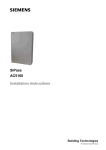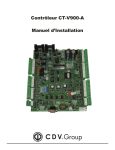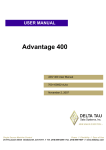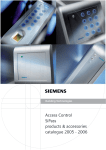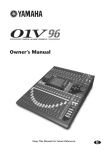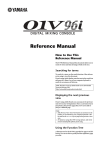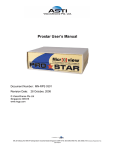Download Siemens AFI5100 Installation manual
Transcript
SiPass integrated AFI5100 Installation manual Fire Safety & Security Products Siemens Building Technologies Liefermöglichkeiten und technische Änderungen vorbehalten. Data and design subject to change without notice. / Supply subject to availability. © 2008 Copyright by Siemens Building Technologies Wir behalten uns alle Rechte an diesem Dokument und an dem in ihm dargestellten Gegenstand vor. Der Empfänger erkennt diese Rechte an und wird dieses Dokument nicht ohne unsere vorgängige schriftliche Ermächtigung ganz oder teilweise Dritten zugänglich machen oder außerhalb des Zweckes verwenden, zu dem es ihm übergeben worden ist. We reserve all rights in this document and in the subject thereof. By acceptance of the document the recipient acknowledges these rights and undertakes not to publish the document nor the subject thereof in full or in part, nor to make them available to any third party without our prior express written authorization, nor to use it for any purpose other than for which it was delivered to him. Contents 1 1.1 1.2 1.3 1.4 1.5 1.6 1.7 1.8 1.9 1.10 Input Point Module (AFI5100) ................................................................5 Product Description...................................................................................5 Product Numbers ......................................................................................5 Prerequisites .............................................................................................5 Expected Installation Time........................................................................5 Mounting Instructions................................................................................6 Wiring ........................................................................................................6 Links and Jumpers ....................................................................................9 LEDs .......................................................................................................10 Recommended Cable Specifications ......................................................11 Programming and Firmware Download ..................................................11 3 Siemens Building Technologies Fire Safety & Security Products 11.2007 4 Siemens Building Technologies Fire Safety & Security Products 11.2007 Input Point Module (AFI5100) 1 Input Point Module (AFI5100) 1.1 Product Description The AFI5100 is an Input Point Module used as part of a Siemens integrated access control and security solution. It provides an interface between an Advanced Access Controller (ACC) and up to 32 input devices used to monitor a secure facility. The AFI5100 continuously monitors the status of all input devices connected; for example, Passive Infrared Detectors (PIRs). Any changes in state are instantly communicated to the ACC and then on to the Host system if necessary. 1.2 Product Numbers 6FL7820-8CB10 1.3 AFI5100 – Input Point Module and base-plate Prerequisites z Input Devices to be connected to the IPM z Cabling (RS-485) z Required Tools & Materials z Medium-duty drill and associated drill-bits (if required) z 4 mounting screws or standoffs (approx. 4mm) z Flat-blade terminal screwdriver z Wire cutters z Cable strippers 1.4 Expected Installation Time 30 minutes 5 Siemens Building Technologies Fire Safety & Security Products 11.2007 Input Point Module (AFI5100) 1.5 Mounting Instructions 1. Remove the AFI5100 from its carton and discard the packaging material. 2. Place the AFI5100 (base-plate) against the surface to which it is to be affixed and mark the location of the mounting holes. 3. If being mounted within a cabinet, simply align the AFI5100 base-plate with the holes located on the cabinet backplane and proceed to step 3. 4. It is recommended that you affix the AFI5100 in all four of the mounting locations. WARNING 1.6 Do not apply power to the IPM or associated components at this stage. 5. Select the appropriate drill bit according to the mounting surface / hole size and drill the holes in the locations marked (if required). 6. Fasten the AFI5100 base-plate to the surface using the correct type of screws or standoffs for the surface. 7. Connect the cabling to the AFI5100 PCB (as described in the next section titled ‘Wiring’). 8. Apply power to the AFI5100 and test its operation. 9. This step may require installation and programming of the access control host software and download of the firmware instruction set. Alternatively, the firmware and configuration may be carried out using the FLN Field Service Tool. Wiring It is recommended that you wear a grounding strap while carrying out this procedure. 1. Connect all input devices to the INPUT ports. Listed end-of-line resistors must be connected to the wiring for each input device if they are to be supervised. If supervised, cable must be shielded and total cable run resistance must not exceed 100 Ohms. Cable shielding must be unconnected at the device end, and connected to the board earth at the IPM end. 2. Connect any devices to the OUTPUT ports. 3. Connect appropriate wiring to the FIRE OVERRIDE INPUT port if required. Listed end-of-line resistors must be connected to the Fire Over-ride Input wires if you are implementing Enhanced Fire Over-ride. Enhanced mode requires the connection of 22Kohm supervision resistor circuits. Cable must be shielded and total cable run resistance must not exceed 100 Ohms. 4. Connect the next device in the Fire Override sequence to the FIRE OVERRIDE OUTPUT port if required. 5. Connect the FLN wires (from the ACC) to the RS485 BUS port. 6. If the FLN cable is long or subject to high noise, ensure that the jumper across link LK10 (EOL) has been made. This only applies to units located on the ends of bus lines. 6 Siemens Building Technologies Fire Safety & Security Products 11.2007 Input Point Module (AFI5100) 7. Connect the active (+ve) and neutral (-ve) wires from the Power Supply Unit (PSU) to the POWER IN port. Ensure the polarity of the connection is made correctly. 8. Check all connections thoroughly. 9. Power can now be applied to the AFI5100 .The following diagram displays the layout and dimensions of the AFI5100 with brace attached: 287mm (11.30") 9mm (0.35") (0.35") 9mm 257mm (10.12") 5mm (0.20") IN+ ININ+ FIRE INPUT IN+ INPUT 3 INPUT2 IN+ IN- INPUT 5 IN- IN- IN+ IN- IN+ IN- INPUT 1 FOR NORMAL LK1LK2 IN+ IN- INPUT 7 INPUT 6 IN+ IN- IN+ IN+ IN- IN+ INPUT 9 INPUT 4 IN+ IN- IN- INPUT 13 INPUT 8 IN+ IN- IN+ IN- INPUT 10 INPUT 11 IN+ IN- IN- INPUT 15 INPUT 14 IN+ IN- IN+ INPUT 12 IN+ IN+ IN- INPUT 16 IN+ INPUT 18 IN+ IN- INPUT 21 IN- IN+ IN- INPUT 17 IN- INPUT 22 IN- INPUT 19 IN- IN+ INPUT 23 IN+ IN- IN+ INPUT 20 IN+ IN- INPUT 25 IN+ IN- INPUT 24 IN+ IN+ IN- IN- IN+ INPUT 26 IN+ IN- INPUT 30 INPUT 29 IN- INPUT 27 IN- INPUT 31 IN+ IN- INPUT 28 IN+ IN- INPUT 32 S/N: FOR FOR ENABLE INPUT1 INPUT2 INPUT3 INPUT4 INPUT5 INPUT6 INPUT7 INPUT8 INPUT9 INPUT10 INPUT11 INPUT12 INPUT13 INPUT14 INPUT15 INPUT16 INPUT17 INPUT18 INPUT19 INPUT20 INPUT21 INPUT22 INPUT23 INPUT25 INPUT24 INPUT26 INPUT27 INPUT28 INPUT29 INPUT30 INPUT32 INPUT31 LK4LK6 LK3 LK7 LK8 LK11 250mm (9.84") OUTPUT1 OUTPUT3 OUTPUT2 OUTPUT4 LK 9 DC OUT 1 DC OUT 2 TX COMMS RX COMMS POWER ACTIVITY BRD - 00005 Siemens Building Technologies LK5 LK12 LK13 LK14 FOR EN FOR DIS LK 10 RLY1 RS-485 E - + RLY2 RLY3 LOCAL IN OUT DC OUT DC OUT OUTPUT 4 OUTPUT 3 OUTPUT 2 IP+ IP- OP+ OP- 0V V+ 0V V+ Nc C No Nc C No Nc C No RLY4 RLY5 OUTPUT 1 FIRE OUT POWER IN Nc C No Nc C No 0V V+ E 7 Siemens Building Technologies Fire Safety & Security Products 11.2007 Input Point Module (AFI5100) The following diagram displays the location of the ports on the AFI5100 : 1 3 2 IN+ ININ- IN+ FOR IN IN+ INPUT 1 IN- IN+ INPUT 5 IN- INPUT 6 IN- IN+ INPUT2 IN- IN+ FOR NORMAL LK1 LK2 IN+ IN+ INPUT 4 IN- INPUT 7 IN- IN+ INPUT 3 IN+ IN- INPUT 9 IN- IN+ IN- IN- IN+ IN- IN+ INPUT 13 INPUT 8 IN+ INPUT 10 IN+ INPUT 11 IN+ IN- IN- INPUT 15 INPUT 14 IN- IN+ INPUT 12 IN+ IN- IN+ INPUT 17 IN- IN+ IN- INPUT 21 INPUT 16 IN+ IN- IN+ IN- INPUT 18 INPUT 19 IN+ IN- IN- INPUT 23 INPUT 22 IN- IN+ IN+ INPUT 20 IN+ IN- IN+ INPUT 25 IN+ IN- IN- IN+ INPUT 29 INPUT 24 IN+ IN- INPUT 26 IN- IN+ IN- IN- INPUT 31 INPUT 30 IN+ INPUT 27 IN- INPUT 28 IN+ IN- INPUT 32 S/N: FOR FOR ENABLE INPUT1 INPUT2 INPUT3 INPUT4 INPUT5 INPUT6 INPUT7 INPUT8 INPUT9 INPUT10 INPUT11 INPUT12 INPUT14 INPUT13 INPUT16 INPUT15 INPUT17 INPUT19 INPUT18 INPUT20 INPUT21 INPUT22 INPUT23 INPUT25 INPUT24 INPUT26 INPUT28 INPUT27 INPUT30 INPUT29 INPUT31 INPUT32 LK4 LK6 LK5 LK7 LK8 LK11 OUTPUT1 OUTPUT3 LK 9 OUTPUT2 OUTPUT4 DC OUT 1 DC OUT 2 TX COMMS RX COMMS POWER ACTIVITY BRD - 00005 Siemens Building Technologies LK3 LK13 LK12 LK14 FOR EN FOR DIS LK 10 RLY1 RS-485 E - 9 + 12V OUT 2 12V OUT 1 LOCAL IN OUT IN+ IN- OUT+ OUT- 8 0V V+ 0V V+ RLY2 OUT 4 OUT 3 Nc C No Nc C No 7 RLY3 OUT 2 Nc C No RLY4 RLY5 OUT 1 FOR OUT DC POWER IN Nc C No Nc C No 0V V+ E 6 5 4 The following table provides a brief description of each port: Port Name Brief Description 1 INPUT 17 – INPUT 32 Input Ports 1 - 32 Inputs for connection to monitoring and input devices 2 INPUT 1 – INPUT 16 Input Ports 1 - 16 Inputs for connection to monitoring and input devices 3 FOR IN Fire Over-ride Input Port Input for Fire Over-ride wiring 4 DC Power IN DC power input 5 FOR OUT Fire Over-ride Output Port Fire Over-ride for connecting devices in Fire Override sequence 6 OUT 1 – OUT 4 Output Ports 1 - 4 Auxiliary Relay-driven Outputs 7 12V OUT 1-12V OUT 2 Auxiliary 12 V DC Power Supply 1-2 12 V DC power source 8 LOCAL IN OUT Tamper In/Out Port Local input and output for tamper detection and alarm 9 RS485 BUS RS485 communications port for connection to an ACC FLN channel 8 Siemens Building Technologies Fire Safety & Security Products 11.2007 Input Point Module (AFI5100) 1.7 Links and Jumpers The following table outlines the link settings for the AFI5100: Value LK1, LK2 Links 1 and 2 are used to configure whether Fire Over-ride (FOR) will operate in Enhanced FOR mode or Normal. To enable Normal Mode: If the links are set to the off position, FOR input will have no effect on the state of the output relays. ENABLE LK4 LK6 FOR operation ignored: LK4 LK6 FOR If the links are set to FOR operation, activation of the FOR input will cause the outputs to return to the NO position. FOR operation active: ENABLE Links 4 and 6 control whether Fire Over-ride (FOR) is enabled. FOR LK4, LK6 LK1 LK2 FOR LK1 LK2 FOR Enhanced mode also requires the connection of a supervision circuit to the Fire Over-ride Input. To enable Enhanced Mode: NORMAL Description NORMAL Link LK3, LK5 These auxiliary links have been included for further enhancement of the system. LK7 LK7 affects the reset action when the RESET link (LK9) is set and the power turned on. LK7 See LK9 below for a description of how to reset the unit. If the jumper on Link 7 is set as shown, it is set to “Full Reset” mode. LK7 If the jumper on Link 7 is taken off, it is set to “Partial Reset” mode. LK8 This is a General Purpose links that has been included for further enhancement of the system. LK9 Memory Clear and Reset Setting LK9 and turning the power off and on will reset the IPM. A full or partial reset can be achieved by setting LK7 on or off. If LK7 is set, the IPM will fully reset and any firmware loaded into the memory will be erased. You will need to re-program the IPM with firmware again before it can operate. If LK7 has the jumper removed, the microcontroller will be rebooted but the firmware will remain in memory. LK10 EOL Termination (Bus) This link allows the RS485 BUS communications channel to be terminated in noisy or lengthy comms. Note: Units located at the end of bus lines only should have this link set. LK11 – LK14 RS485 BUS port not terminated. Enabling Fire Override for a relay means that when the FOR input is activated, the relay output switch to the NO position. LK10 LK10 EOL FOR Activation These links allow FOR activation to be enabled or disabled for each individual relay output. RS485 BUS port terminated. EOL LK11 LK12 FOR EN FOR DIS In the above diagram LK11 (Relay 1) is set to FOR Enabled and LK12 (Relay 2) is set to FOR Disabled. 9 Siemens Building Technologies Fire Safety & Security Products 11.2007 Input Point Module (AFI5100) 1.8 LEDs The following table describes the operation of the LEDs located on the AFI5100 : LED Brief Description POWER The POWER led is illuminated when power has been applied to the device. ACTIVITY The ACTIVITY led indicates that the AFI5100 is accessing information contained in its internal database or performing a routine operation. This LED also indicates whether the initial instruction set has been downloaded. If power is applied and the LED blinks quickly, the AFI5100 instruction set (firmware) needs to be downloaded. If the LED is blinking slowly, approximately once per second, a firmware set has already been downloaded. Tx COMMS The Transmission COMMS LED flashes when the IPM is sending data to the ACC to which it has been connected (via an FLN). Rx COMMS The Transmission COMMS LED flashes when the IPM is receiving data from the ACC to which it has been connected (via an FLN). Inputs The tricolor Input Port LEDs indicate the current status of the input port. See the table below for an explanation of the colors. Outputs Each Output Relay has a corresponding LED that is illuminated when the relay is activated. Fire The Fire LED is illuminated when Fire Over-ride is activated. Each input LED may be in one of two states as indicated by color. LED Color Input status Fire Over-ride status Green Denotes input Normal: Closed Denotes FOR Normal: Closed Orange Denotes input Normal: Open Denotes FOR Normal: Open (alarm) 10 Siemens Building Technologies Fire Safety & Security Products 11.2007 Input Point Module (AFI5100) 1.9 Recommended Cable Specifications The following table outlines the cable recommended for connection of an integrated security system: Communication Type RS485 RS232 RS422 RJ-45 RJ-12 Power (12/24 V DC) Recommended Cable Specifications Core Pairs AWG Stranding Wire Type Insulation Shield Jacket 4 2 28 7 x 36 Tinned Copper Polyethylene Aluminium foil- Polyester tape / braided shield PVC 6 3 28 7 x 36 Tinned Copper Polyethylene Aluminium foil- Polyester tape / braided shield PVC 8 4 28 7 x 36 Tinned Copper Polyethylene Aluminium foil- Polyester tape / braided shield PVC 4 2 24 7 x 32 Tinned Copper Polyethylene Aluminium foil- Polyester tape / no braid PVC 6 3 24 7 x 32 Tinned Copper Polyethylene Aluminium foil- Polyester tape / no braid PVC 8 4 24 7 x 32 Tinned Copper Polyethylene Aluminium foil- Polyester tape / no braid PVC 4 2 24 7 x 32 Tinned Copper Polyethylene Aluminium foil- Polyester tape / no braid PVC 6 3 24 7 x 32 Tinned Copper Polyethylene Aluminium foil- Polyester tape / no braid PVC 8 4 24 7 x 32 Tinned Copper Polyethylene Aluminium foil- Polyester tape / no braid PVC 8 4 24 Solid Bare Copper Polyethylene Unshielded PVC 8 4 24 7 x 32 Tinned Copper Polyethylene Unshielded PVC 8 4 24 Solid Bare Copper Polyethylene Aluminium foil- Polyester tape / no braid PVC 8 4 24 7 x 32 Tinned Copper Polyethylene Aluminium foil- Polyester tape / no braid PVC 2 1 18 19 x 30 Tinned Copper Polyethylene Unshielded PVC The previous table provides a guideline for selecting an appropriate cable type only. Other cable types are also compatible with the system and can be used to achieve the same results. 1.10 Programming and Firmware Download The AFI5100 is programmed using the host software application via the ACC, or using the FLN Configurator Field Service Tool application. Please refer to the appropriate User’s Guide for more Information. Information in this document is based on specifications believed correct at the time of publication. The right is reserved to make changes as design improvements are made. 11 Siemens Building Technologies Fire Safety & Security Products 11.2007 Issued by Siemens Building Technologies Fire & Security Products GmbH & Co. oHG D-76181 Karlsruhe www.sbt.siemens.com Document no. A24205-A335-B245 Edition 11.2007 © 2008 Copyright by Siemens Building Technologies Data and design subject to change without notice. Supply subject to availability. Printed in the Federal Republic of Germany on environment-friendly chlorine-free paper.












